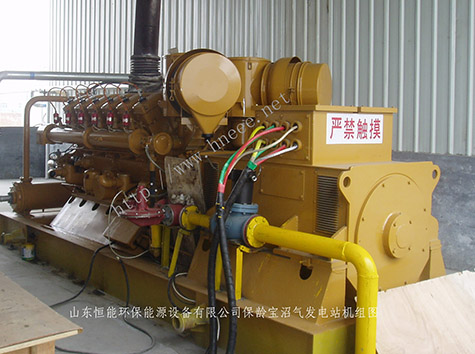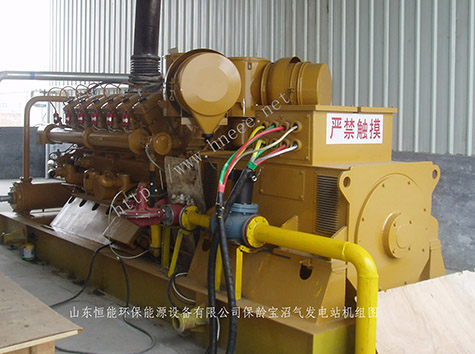沼气发电机组:沼气发电机组工作原理及优缺点
沼气发电机组工作原理及优缺点
Working principle and advantages and disadvantages of biogas generator sets
1.单燃料沼气发电机组工作原理及优点:将“空气沼气”的混合物在气缸内压缩,用火花塞使其燃烧,通过活塞的往复运动得到动力,然后连接发电机发电。
1. Working principle and advantages of a single fuel biogas generator set: The mixture of "air biogas" is compressed in the cylinder, burned with a spark plug, and powered by the reciprocating motion of the piston, which is then connected to the generator for power generation.
① 不需要辅助燃料油及其供给设备
① No need for auxiliary fuel oil and its supply equipment
② 燃料为一个系统,在控制方面比可烧两种燃料的发电机组简单
② Fuel is a system that is simpler in control compared to a generator set that can burn two types of fuels
③ 发电机组价格较低
③ The price of the generator set is relatively low
2.双燃料沼气-柴油发电机组工作原理及优点:将“空气燃烧气体”的混合物在气缸内压缩,用点火燃料使其燃烧,通过活塞的往复运动得到动力,然后连接发电机发电。
2. Working principle and advantages of dual fuel biogas diesel generator set: The mixture of "air combustion gas" is compressed in the cylinder, ignited with fuel, and powered by the reciprocating motion of the piston, and then connected to the generator for power generation.
① 用液体燃料或气体燃料都可工作
① It can work with either liquid fuel or gas fuel
② 对沼气的产量和甲烷浓度的变化能够适应
② Adapt to changes in biogas production and methane concentration
③ 如由用气体燃料转为用柴油燃料在停止工作,发电机组内不残留未燃烧的气体,因为饿耐腐蚀性好
③ If gas fuel is used instead of diesel fuel and the generator set stops working, there will be no residual unburned gas in the generator set because it has good corrosion resistance

两种沼气发电机组缺点:工作受到供给的沼气的数量和质量的影响
Disadvantages of two types of biogas generator sets: their operation is affected by the quantity and quality of biogas supplied
① 用气体燃料工作时也需要液体辅助燃料
① When working with gas fuel, liquid auxiliary fuel is also required
② 需要液体燃料供给设备
② Liquid fuel supply equipment is required
③ 控制机构稍复杂
③ The control mechanism is slightly more complex
④ 价格较单燃料式发电机组稍高
④ The price is slightly higher than that of single fuel generator sets
有机废水沼气发电机组
Organic wastewater biogas generator set
什么是有机废水
What is organic wastewater
有机废水就是以有机污染物为主的废水,有机废水易造成水质富营养化,危害比较大。 在生活污水、食品加工和造纸等工业废水中,含有碳水化合物、蛋白质、油脂、木质素等有机物质。这些物质以悬浮或溶解状态存在于污水中,可通过微生物的生物化学作用而分解。在其分解过程中需要消耗氧气,因而被称为耗氧污染物。这种污染物可造成水中溶解氧减少,影响鱼类和其他水生生物的生长。水中溶解氧耗尽后,有机物进行厌氧分解,产生硫化氢、氨和硫醇等难闻气味,使水质进一步恶化。水体中有机物成分非常复杂,耗氧有机物浓度常用单位体积水中耗氧物质生化分解过程中所消耗的氧量表示,即以生化需氧量(BOD)表示。一般用20℃时,五天生化需氧量(BOD5)表示。
Organic wastewater is wastewater mainly composed of organic pollutants, which can easily cause eutrophication of water quality and pose significant harm. Organic substances such as carbohydrates, proteins, fats, and lignin are present in industrial wastewater such as domestic sewage, food processing, and papermaking. These substances exist in suspended or dissolved states in wastewater and can be decomposed through the biochemical reactions of microorganisms. During its decomposition process, it requires the consumption of oxygen, hence it is called an oxygen consuming pollutant. This pollutant can cause a decrease in dissolved oxygen in water, affecting the growth of fish and other aquatic organisms. After the dissolved oxygen in water is depleted, organic matter undergoes anaerobic decomposition, producing unpleasant odors such as hydrogen sulfide, ammonia, and thiols, further deteriorating the water quality. The composition of organic matter in water is very complex, and the concentration of oxygen consuming organic matter is commonly expressed as the amount of oxygen consumed during the biochemical decomposition process of oxygen consuming substances per unit volume of water, which is expressed as biochemical oxygen demand (BOD). Generally, the biochemical oxygen demand (BOD5) for five days is expressed at 20 ℃.
本文由沼气发电机组提供技术支持,更多的详细精彩内容请点击我们的网站http://www.huannengpower.com们将会全心全意为您提供满意的服务。
 在线咨询
在线咨询 官方二维码
官方二维码




 当前位置:
当前位置: 2024.05.07
2024.05.07






